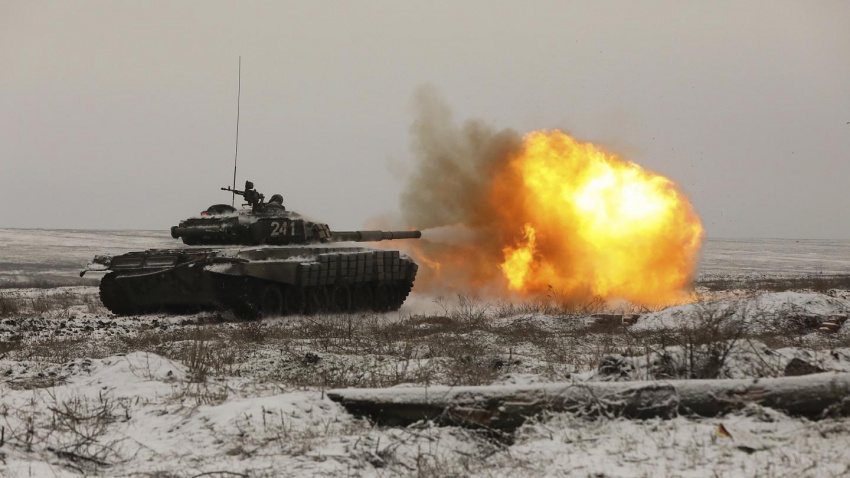Speaking in an interview with the website of the Strategic Council on Foreign Relations, Morteza Makki continued: Moscow’s effort is based on maintaining the shadow of the war on Ukraine in order to be able to get the maximum concessions from Western governments in recognizing Russia’s red lines and preventing NATO expansion into the former Soviet republics.
Stating that the reaction of the European governments, the US administration and the Ukrainian government towards the crisis is considerable, Makki explained: The US government is trying to challenge Moscow’s military line-up on Ukraine’s borders while opposing giving any concessions to Russia, and by inciting Russia, to catch the country in the trap of Ukraine.
According to the expert, in the event of Russian military intervention in Ukraine, Moscow may gain some achievements in the short term, but in the medium and long term, Russia’s military equipment is not enough to be used to counter the expansion of NATO influence in Ukraine.
He added: So in all likelihood, if war breaks out, Russia may be forced to leave Ukraine with heavy casualties.
The expert on Europe affairs said that European governments have a different position than the United States, adding: Germany and France are strongly opposed to inciting Russia to take military action in Ukraine; because the consequences of any military intervention in Ukraine will be borne by European governments.
He continued: About 40% of European countries gas is supplied by Russia, so any disruption in the process of Russian gas exports to Europe due to the 6-fold increase in gas prices in European countries over the past year will pose risks for European governments.
The expert stressed that the wave of migrants that will flow from Ukraine to Europe is also another concern of European governments from the escalation of tensions and war in Ukraine. Moreover, in the event of a Russian military invasion of Ukraine, the power and ability of European governments to advance their foreign and security policies will be challenged and they will be forced to follow the US aggressive policy in the confronting with Russia; this is against the wishes of European governments, especially France and Germany, which are seeking independent security arrangements in Europe.
Regarding the Ukrainian government’s policy in that crisis, Makki said: Given that the Kiev government has pursued a policy of convergence with the West, it seems that it is more in line with US foreign policy and is very unhappy with the cautious and conservative approaches of European governments, Germany in particular; but, due to its extensive economic and trade cooperation with those countries and its efforts to join the European Union, the Ukrainian government has no alternative but to align itself with the European governments.
As for the role of the Security Council and in reply to the question that if the Security Council could offer a solution to the Ukraine crisis, he said: Given Russia’s permanent membership in the UN Security Council, international and regional institutions such as the Council of Europe do not seem to be able to play an effective role in reducing tensions and crises in Ukraine, and any issuance of drafts, resolutions or meetings of the Security Council has a more political and psychological aspect which is addressed to the Russian government.
The expert also commented about the future of tensions, noting: Given that the Ukraine crisis is the result of a series of developments since the collapse of the Soviet Union over the past three decades, and that the geopolitics of the region is changing, it does not appear that the level of tension and crisis will decrease in the near future.
He also referred to the history of Ukraine-Russia relations and said: Ukraine has been intertwined in Russian culture, language and race for 12 centuries; the two major Russian wars against Napoleon and the Nazis took place in that country. During the Cold War, Berlin was the buffer line between the East and West blocs. After the collapse of the Soviet Union, Ukraine became a buffer line between Russia and the West. Until 2014, Russia sought to counter the development and convergence of the pro-Western current in Ukraine by strengthening the pro-Moscow faction in the Ukrainian governing body. But in 2014, Yanukovych was in a position that between signing a cooperation agreement with Russia or the European Union, chose Moscow. It was here that pro-Western movements in Ukraine staged a coup against pro-Russian Yanukovych, and this policy provoked the Kremlin’s reaction to the annexation of the Crimean peninsula to Russian territory and the uprising in eastern Ukraine.
He continued: Over the past seven years, the pro-Western Ukrainian government has pursued a policy of convergence with the West, and we are witnessing the expansion of Ukraine’s four-fold economic cooperation with European governments compared to the period before 2014.
According to the expert, Ukraine’s request for membership in NATO and NATO maneuvers in the Black Sea in recent years has prompted Vladimir Putin to use the tools of Russian military power to counter NATO expansion into Ukraine.
In conclusion, Makki explained the outlook for the crisis and said: Given Putin’s targets and expectations of a military deployment on the Ukrainian border, and the resistance we have seen from the US administration and some European governments to that Russian expectation, there is a low possibility that tensions in Ukraine crisis will ease in the near future; because any step back by the Kremlin would be a failure for the country to block NATO’s policy of containment on its borders.










0 Comments